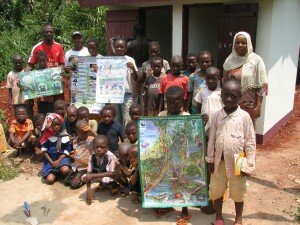By: Kim Koporc, Director, Children Without Worms (CWW)
 Those of us in global health far too often see the consequences that people living in developing countries face because basic human necessities – clean water and sanitation – are not available to them. In addition to causing diarrheal diseases, lack of access to clean water and sanitation is also a culprit in many neglected tropical diseases (NTDs) particularly intestinal worms. Today, World Water Day, serves as a reminder of how much disease could be prevented if people had access to clean water.
Those of us in global health far too often see the consequences that people living in developing countries face because basic human necessities – clean water and sanitation – are not available to them. In addition to causing diarrheal diseases, lack of access to clean water and sanitation is also a culprit in many neglected tropical diseases (NTDs) particularly intestinal worms. Today, World Water Day, serves as a reminder of how much disease could be prevented if people had access to clean water.
Through the partnership with Johnson & Johnson, CWW distributes mebendazole to reach school-age children in eight countries. However, de-worming alone is not enough, so our work focuses on an integrated approach that will not just rid children of worms once they are infected, but break the cycle of infection.
The World Wildlife Fund (WWF) is best known for its conservation work, but it has also been a key partner in our effort to bring Soil Transmitted Helminths (STH) under control in Cameroon because good human health and good environmental health go hand-in-hand.
CWW began collaborating with the World Wildlife Fund’s Population-Health-Environment (WWF-PHE) program in Cameroon to promote the WASHED framework – a comprehensive approach that advocates for access to water, sanitation, hygiene education and de-worming medication to minimize the risk of STH infection. The PHE program works in the southwest of the country, in villages bordering the Lobeke National Park. The program partners with the local government and a Catholic hospital to promote hygiene, access to potable water, improved sanitary latrines and de-worming school-age children, among other health-promoting activities.
 Beginning in 2009, WWF began assisting communities to build latrines and improve water quality at schools to help reduce the risk of infection in an area where 90% of the households do not have access to proper sanitation. Community education through volunteer health workers is also a key component of the program. CWW and WWF anticipate that the promotion of the WASHED framework in schools will result in a significant reduction in STH and other water-borne illnesses.
Beginning in 2009, WWF began assisting communities to build latrines and improve water quality at schools to help reduce the risk of infection in an area where 90% of the households do not have access to proper sanitation. Community education through volunteer health workers is also a key component of the program. CWW and WWF anticipate that the promotion of the WASHED framework in schools will result in a significant reduction in STH and other water-borne illnesses.
It has been rewarding to see the human and environmental benefits as this program has taken hold. There is still much to do, but more children in Cameroon are able to learn, play and grow up healthy as a result of this partnership. Together, we will always achieve more. World Water Day is a chance to look at the progress that has been made, and to look forward to the progress still to come.
Ms. Kim Koporc offers over 15 years experience in international health and development in her role as Director of the Children Without Worms Program. She received her Master of Public Health from Tulane University, and her Master of Business Administration from Emory University. As Director of Children Without Worms, she is responsible for overseeing the day-to-day operations of the program and liaising with recipients and program partners.
